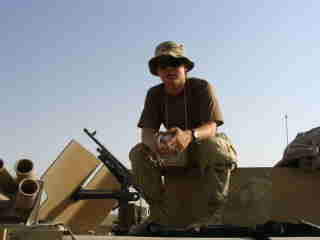My team consists of a major, a staff sergeant and two buck sergeants.
We have, collectively, nine tours in Irakistan, and about fifty years
of service. We would be entirely useless, however, without our
interpreters.
I shall refer to them by their "terp names," since we do not use their
real names for anything other than pay purposes. We (my team) have
three, two of whom are on the FOB with us at any given time. They are
Tim, Ronoldo and Ali. Two are guys from the local community, and the
other is from Baghdad.
All ours are Arabs. That's a good thing, since several of the groups
here have been assigned Kurdish terps. The Kurdish terps tend to have
decent English, but their Arabic often leaves something to be desired
and, occasionally, the presence of a Kurd is less than helpful.
Ronoldo is a younger guy, working on his paperwork to get a visa to
the US. I would hope that if he is successful, he applies himself to
whatever stateside work he finds with the same diligence he's pursuing
the visa, rather than the diligence he brings to his duties with us.
Because he is one lazy dude. Decent interpreter if you can:
A- Find him
B- Wake him up
C- Get him to admit he's healthy enough to work
Then there's Ali. Ali is a local and a very nice man. However, Ali's
English leaves a bit to be desired. OK – make that a lot to be
desired. OK – to be perfectly honest, let's go ahead and say that Ali
doesn't speak any English at all beyond "OK" and "would you like to
drink chai with me?" The guys hear that second one a lot, which
creeps them out a little.
But the third terp, that one makes up for the other two. Because the
third one is Tim – superterp. Tim is also a local, a respected family
man who has worked as a schoolteacher (of – what else? – English).
Tim has been working for Coalition Forces since shortly after the
invasion. He has visited each and every village, asking about the
status of sewer, water, electricity, academics, trash, medical,
transportation and agriculture (a godawful combination we refer to as
SWEAT-MTA). He has interpreted the negotiations for most of the
projects, successful and failed, in the area. He is, in short, a
lifesaver.
We made it through our first month or so here in typically stupid
fashion, slaving diligently to re-invent the wheel and generally
acting like we were the first US Soldiers to set foot in these little
towns. Until we began to tap into the wisdom of Tim.
"Tim, that contractor seemed like he was up to no good. Do you have
any idea about that?"
"Well, yes, sergeant Abby. His uncle is Sheik Thatguy, on the
council, and makes sure he gets contracts. But he is stupid and
incapable of building things – he has been stupid since he was a small
boy – and his oldest son does most of the site management. That
oldest son is named Amar, and he is over there in the green T-shirt."
And the lights came on and the angels sang.
And now, we are able to reach that rarest of Nirvanas for those of us
working with the populace out here – sometimes, we can figure out what
the Hell is going on.
"Tim, what's up with that group of women who say they live in some
village where there's no water or anything?"
"They are part of a tribe that had a murderer. The murderer killed
someone in the neighbor tribe – all of this happened in the Next Town
Over – and there was…revenge? Another killing? For honor?"
"An honor killing? To set things right?"
"Yes. But of course, that is not all. So the murderer's family had
to leave and now they are all in one neighborhood and there are not
many men. They are pitiful."
"Can we do anything about it?"
"No. Nobody cares to help them. They had a murderer. That is the way it is."
It's especially helpful when he explains "the way it is."
"Tim, there are a lot of farmers here. People are interested in
starting a 4-H program to teach kids better farming techniques. Do
you think that will catch on?"
"No. "
"Why not? Everybody loves 4-H!"
"The people here are already farmers. They do not have money and
seed. They do not need to be taught to farm. The children work on
the farms. That is the way it is."
Sometimes it's not work-related, just interesting.
"Tim, do you take your family on vacations?"
"Sometimes, before 2003. But not often."
"Why not?"
"It is complicated. I have eight children, and to take my family on
vacation, I must first ask my wife's mother."
"Your wife's mother? I don't get it."
"Yes. It is difficult. But it is the way it is."
Often, Tim drops by and hangs out on my porch. We've talked about all
sorts of things, from Saddam's use of chemical weapons to oil
refineries in Israel. I've asked a couple of times what Tim intends
to do when the US leaves Iraq. He's torn, more so than most of the
terps. Of course, he's older, and a family man.
"I do not know, sergeant Abby," he says, lighting another cigarette
and accepting a soda. "I think it might be best to leave here, but
with a family…"he shrugs. "These things are not easy."

|